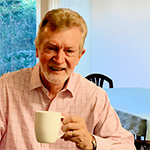
It was Paula D’Arcy who wrote, God comes to us disguised as our life.
Paula D’Arcy wrote those words after a drunk driver killed her husband and one-year-old child, when Paula was just 27, and three months pregnant.
Frederick Buechner echoes a similar insight. He suggests living a spiritual life is to ‘listen to (our) life’.
I share a story from my life, in which I tried to listen to my life.
In 1981, I accompanied a group of young people on a pilgrimage to an Eucharistic Congress in Lourdes, France. In the preceding months, I sensed I might experience spiritual healing during the pilgrimage.
The previous couple of years had been difficult for me. I sensed I needed healing.
In 1979, during my first country parish appointment that lasted only eight months, several traumatic things happened.
First, I had a serious car accident while driving on a country gravel road. The back-right tyre of my vehicle blew out and the car rolled three times.
I survived with only minor injuries.
I was fortunate that the only police officer in a hundred kilometres passed by fifteen minutes later.
Second, I was helping set up a women’s refuge. An anonymous person left a phone message saying there was a contract out on my life.
In speaking to the police, they said they could do nothing until something happened!
I felt very vulnerable, as I often drove along isolated country roads.
Third, I became embroiled in a murder suicide that left three young children orphaned.
Fourth, I contracted a viral illness that incapacitated me for over nine months.
I am grateful to the Mercy sisters who lived nearby. They took me in and looked after me during the acute phase of my illness before I went to the hospital.
The accumulated trauma scarred me. I needed inner healing.
Before departing for France on the pilgrimage, the organisers considered cancelling the trip. A gunman had wounded Pope John Paul II, who was due to lead the main celebrations at the Congress in Lourdes.
Upon arriving in Lourdes, we discovered our prearranged accommodation had fallen through. Later, we found a place to stay.
Mindful of seeking healing during the pilgrimage, I walked to the nearby grotto where the Marian apparitions had occurred.
I wondered, is this where I shall find spiritual healing?
The day was wet and freezing.
When I arrived, it surprised me to find the grotto was a rocky cave on the side of a hill.
The grotto looked shabby. Black soot caked the walls from thousands of burnt candles of pilgrims over the years.
I found no healing here.
A day later, our pilgrimage group walked to the Lourdes baths, famous for miraculous healings.
I wondered, is this where I shall find spiritual healing?
Nothing happened to me.
In fact, the water was so icy that, instead of being healed in the miraculous waters, I caught a nasty cold.
The next day, I attended an outdoor English-speaking liturgy in a nearby field. Thousands of people were present, and I wondered, is this where I shall experience healing?
An African cardinal, who was representing the pope at the Congress, was the main celebrant and an American bishop was preaching.
During the liturgy, we had intermittent soft rain, and the ground became boggy. What I hoped would be a significant spiritual moment did not happen.
While the preacher was speaking, the African cardinal, who had not turned off his lapel microphone, fell fast asleep.
He snored right through the sermon.
To make things worse, he was wearing a high Roman mitre. Every time his head nodded a few centimetres, because of its height, the top of his mitre resembled a flag flapping in the breeze.
After the liturgy, while walking back to my lodgings, I was wondering; what is happening?
Where is God in this dismal turn of events?
In coming to Lourdes, to this special Marian shrine, I thought I would have a significant spiritual encounter; it was not happening.
To make things worse, the road back to my lodgings was boggy and for those of you who know me well, I hate getting mud on my shoes.
Then, walking further along, I experienced a quiet, gentle presence come over me, a healing stillness that touched the core of my being.
In the following months, I reflected on these events.
I realised I was seeking to find my spirituality amidst the extraordinary events of life.
My spiritual healing happened in the ordinariness of my life while walking along a muddy road.
This reminds me of a saying by Pierre Teilhard de Chardin, ‘We are not human beings having a spiritual experience. We are spiritual beings having a human experience’.
Life is not a dichotomy, nor are we dualist. We do not have two lives, spiritual and real-world.
God comes to us disguised as our life. To live a spiritual life is to listen to our life.